The diet of our closest living relatives should undoubtedly gain more attention in nutrition science, as it helps us rediscover what our own natural diet looks like!
Alienation from nature and natural foods
We live so far away from nature that we have gotten to the point where we are unsure about the human diet. The reason for the disorientation is that we do not live within our original natural habitat. We have overcome the limitations given by our biology with our intelligence and skills to manipulate the environment around us including our food sources: we create new food sources by changing the chemical composition through heating and processing.
For example, grains and legumes are not edible in their natural state. Changing the taste and texture of foods by cooking and seasoning tricks our instinctual knowledge and turns otherwise untasty, inedible matter into edible and palatable foods.
We extensively manipulate nature to create conditions that better suit our needs through cultural adaptation. This is why our food choices are heavily influenced by cultural habits – rather than natural instincts – today.
However, this deviation from natural living comes at the price of compromised health because it means moving away from the naturally evolved balance between body biochemistry and natural food chemistry.
So where can we go from here? Given our remarkable genetic, anatomical, and physiological similarities, it is undoubtedly plausible that we can learn about our diet from chimpanzees. As opposed to us – the animals are smart and stick to nature within their natural habitat!
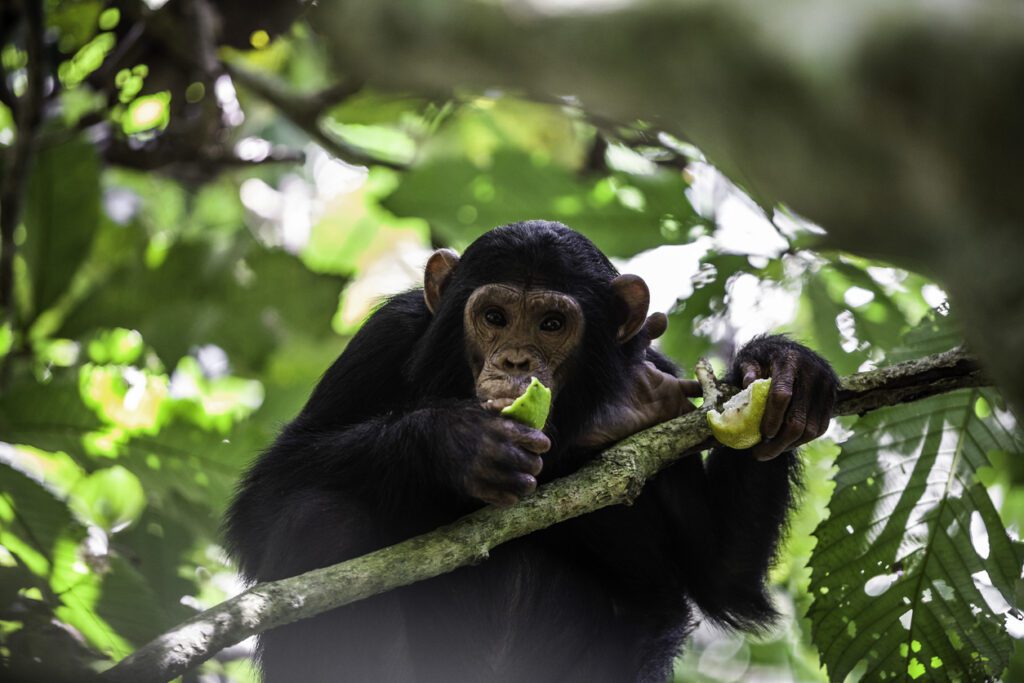

The chimps’ diet helps us understand the human diet
Chimpanzees are observable within their wild, natural habitat. Unlike humans, we can study what foods the animals choose from nature – raw and unaltered. In contrast, humans have created a filter of civilization that clouds our view of what biologically suitable foods for humans are. It has got to the point that we wouldn’t eat many of the modern foods that we eat on a daily basis, raw and unseasoned!
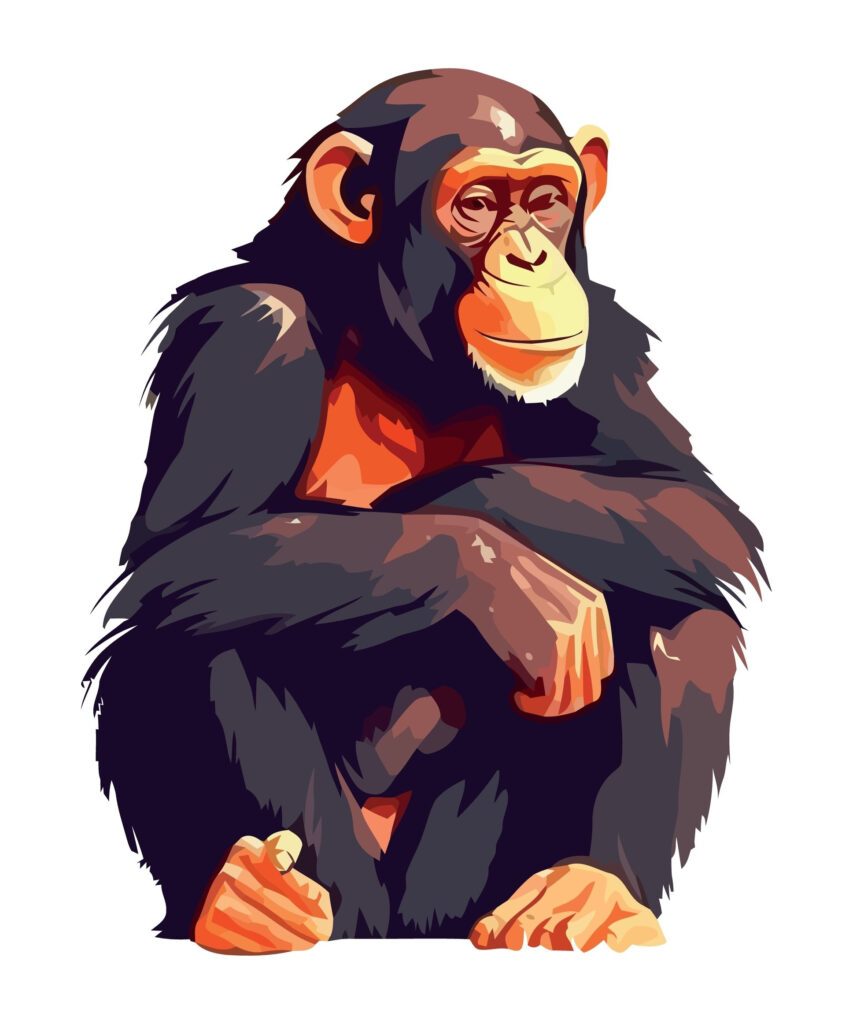
How similar are chimpanzees and humans in terms of nutritional requirements? They are known to be highly similar! The nutrient requirements are nearly identical, which is why the RDAs for humans are used for dietary guidelines for chimpanzees in captivity. Vice versa, studying the natural chimpanzee diet can be just as useful to understand the human natural diet.
Therefore, a realistic depiction of the chimpanzees’ diet is highly relevant to what we think a healthy human diet looks like! For example, a distorted perception of meat consumption (and generally food choices) of chimpanzees results in a misleading promotion of an omnivorous high-meat diet in humans! Chimpanzees do hunt but eat much less meat than we find in an average human diet – chimps eat 1-2 % meat, while the standard diet of humans contains nearly 20% meat. Chimps get most of their protein from fruits and nuts, not animal-based foods! Read this in-depth article here.
Besides meat consumption, the chimpanzee diet also helps us critically evaluate other foods and environmental factors of their habitat in a comparative approach (see below).
To understand our natural diet better, we first have to know more about what the chimpanzees actually eat:
Chimpanzees are highly frugivorous – are humans too?
Chimpanzees are classified as frugivorous omnivores, and in scientific literature, the apes are described as frugivores: specialized fruit-eaters.
While chimpanzees are able to eat plants and animal foods – as humans do – they eat primarily ripe fruits in the wild. Fruits are their preferred food! Read more about their diet here.
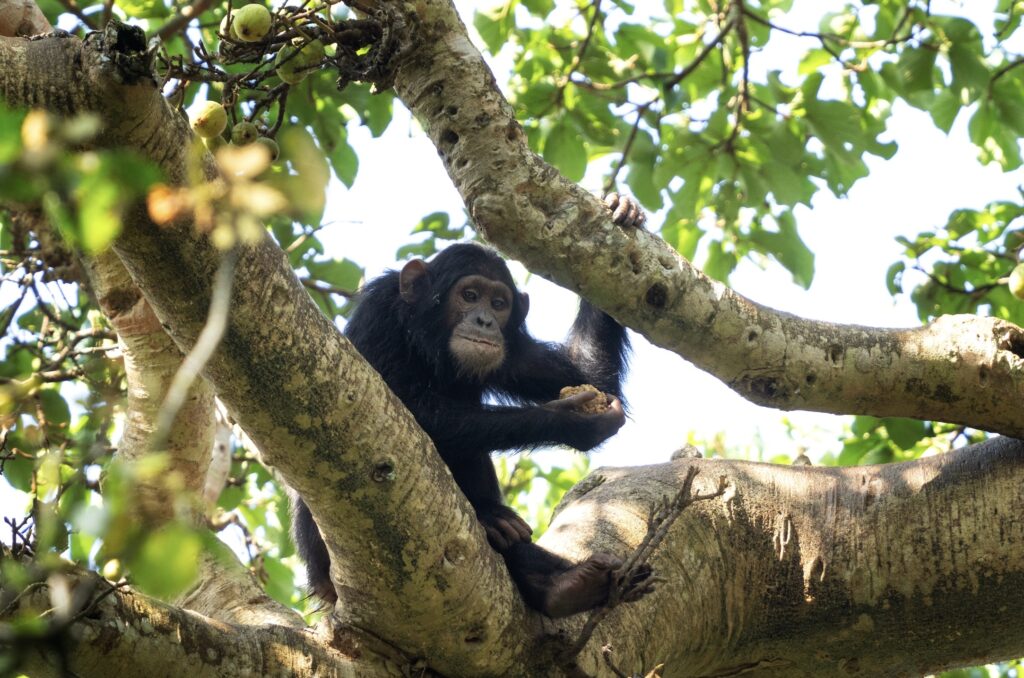
Chimpanzees are classified as both, omnivores and frugivores!
In the wild, their diet consists of 96% plant-based foods, of which 70% is tropical ripe fruit. Meat accounts for only 1-2%. Their diet is all raw!
Depending on fruit availability, chimps forage for other types of plant foods and animal-based foods like insects, eggs and meat. But the observed portion of animal foods in their diet is tiny, and the quantity of meat is negligible… or sometimes even seems non-existent. Most tropical monkeys and apes are frugivores.
Humans obviously have much in common with chimpanzees, as the two species are very closely related and share many traits – but what about diet? A huge giveaway of a fruit-heavy diet is the loss of vitamin C production: the GULO gene has mutated in frugivorous species across the animal kingdom. But there are many more characteristics of frugivores in humans, discussed below. So the question should emerge: are we naturally frugivores, too?
Comparing us to chimpanzees reveals that this is indeed a highly likely scenario:
Humans are tropical frugivores, too!
Humans and chimpanzees share many biological traits related to foraging and eating, like the shape of hands, sweet taste receptors, digestion, teeth, metabolic characteristics, and other features that have evolved with specialized fruit-eating:
Like chimpanzees and many other primates, humans have distinct adaptations to high-fruit diets. Examples are the complex hand, loss of Vitamin C production, specialized color-vision, and attraction to fruits. Thus, we should start learning from chimpanzees in the wild, as suggested by K. Milton in her epic paper from 1999 (visit here). After all, humans and chimpanzees are physiologically so similar that the chimpanzees’ nutritional requirements (for feeding in captivity) were based on human values (Fulk et al., 1992).
“Anthropoids, including all great apes, take most of their diet from plants, and there is general consensus that humans come from a strongly herbivorous ancestry. Though gut proportions differ, overall gut anatomy and the pattern of digestive kinetics of extant apes and humans are very similar.”
K. Milton
Comparing the chimp and “standard” human diet
Comparing the chimpanzee diet to the modern human diet is complex, with the main issue being the alienation from nature and food quality: chimpanzees live still within their natural habitat, tropical climate (sunshine), and wild food sources. Most humans do not, which has implications for adopting a species-appropriate diet!
For example, wild fruits consumed by primates have another carbohydrate profiles (higher in fructose and lower in sucrose) and are higher in micronutrients, proteins and fiber than cultivated fruits:
“Humans clearly come from an evolutionary past in which hexose (fructose) – rather than sucrose-dominated fruits were consumed, and human digestive physiology should, therefore, be best adapted to a carbohydrate substrate similar to that of wild fruits. But, in addition, wild fruits differ in other respects from their cultivated counterparts. These include a high content of roughage – woody seeds, fibrous strands – as well as higher average protein levels, higher levels of many micronutrients … and , at times, considerable pectin.”
Kathrine Milton; 1999
Chimpanzees do hunt but eat much less meat than we find in an average human diet – chimps eat 1-2 % meat, while the standard diet of humans contains nearly 20% of meat in the US. (Although this exact data is from 1988, the calculation from the last few years shows that the percentage remains approximately the same.) Additionally, humans consume around 10% of dairy and often have grains and cooked foods as the main staple foods. In contrast, chimpanzees eat an all-raw diet, with fruits as their carbohydrate source – instead of complex carbohydrates from grains.
The table below can serve as an overview of a frugivore diet. The can help us look at our own particular diet and get an idea of how closely we stick to a natural diet.
| Food Type | Chimpanzee | Human |
|---|---|---|
| Tropical Fruits | 70% | |
| Temperate Fruits | none | |
| Fruit Vegetables | none | |
| Nuts and seeds | 5% | |
| Greens / leaves /sprouts | 21%2 | |
| Roots (starchy vegetables) | ? | |
| Flowers | 4% | |
| Grains / legumes | none | |
| Meat (incl. poultry & fish) | usually 1-2%3 | 20%1 |
| Insects | 4,2%2 | |
| Eggs | 1%3 | 2-3%1 |
| Dairy | none | 10%1 |
| total animal products | 6%2 | 36%1 |
| Cooked foods | none | usually 30-80% |
| Raw foods | 100%4 | usually 20-70% |
| Processed foods | none | highly individual |
Chimpanzees do naturally supplement their diet with mineral-rich matter (see here) and also have been observed to self-medicate with herbs (see here).
What does all of the above mean for the human diet? We can compare foods and dietary habits to learn about a natural frugivorous diet. We can also still rely on our natural instincts like animals do by asking ourselves: would I hunt and eat a smaller vertebrate and eat it raw, as a chimp does? Most of us would do this only if nothing else were available.
Example of a frugivorous meals during a day
This is an example of a day of frugivorous meals of ca 2000- 2500 calories a day:
- One açai bowl with 200 grams açai berries and 3 bananas, plus added greens and chia seeds (650-700 calories)
- One handful of Brazil nuts (150-200 calories)
- One banana and one mango as a snack (200-250 calories)
- A fruit meal with a variety of fruits (300-400 calories)
- One handful of pecan nuts (150-200 calories)
- One large green salad with avocado and mangoes (300-400 calories)
- Banana Smoothie with coconut milk (250-350 calories)
If we compare this to chimpanzees we see that on a raw, plant-based diet, eating large amounts of food is observed in nature: Chimpanzees eat around 3-6 kilos of food in the wild – depending on the food type and body weight (a wide range between 25 – 70 kg)! They eat around 80 different “food items” and basically eat throughout the who
Why do humans eat the way they do today?
Humans can be described as cultural omnivores but biological frugivores. Humans have distinct traits, and characteristics specialized for fruit-eating (read more here).
Humans have invented and adopted food processing, like cooking, mixing, and seasoning, to make otherwise inedible foods edible and palatable in cold areas, where fruits are not abundant and nutritious enough to sustain frugivorous primates. We have to remember that humans are a tropical species!

However, those foods are not optimal for our biology and are “only” survival foods. We still have no major adaptations to cooked foods other than a higher tolerance to the toxicity that comes with it.
Inuits are one example of having integrated raw meats into their diet because of the harsh environment without vegetation to sustain a frugivore or plant-based human diet. Those conditions do not allow for a high average age. Thus, for humans, meat is a survival food – not a primary food source!
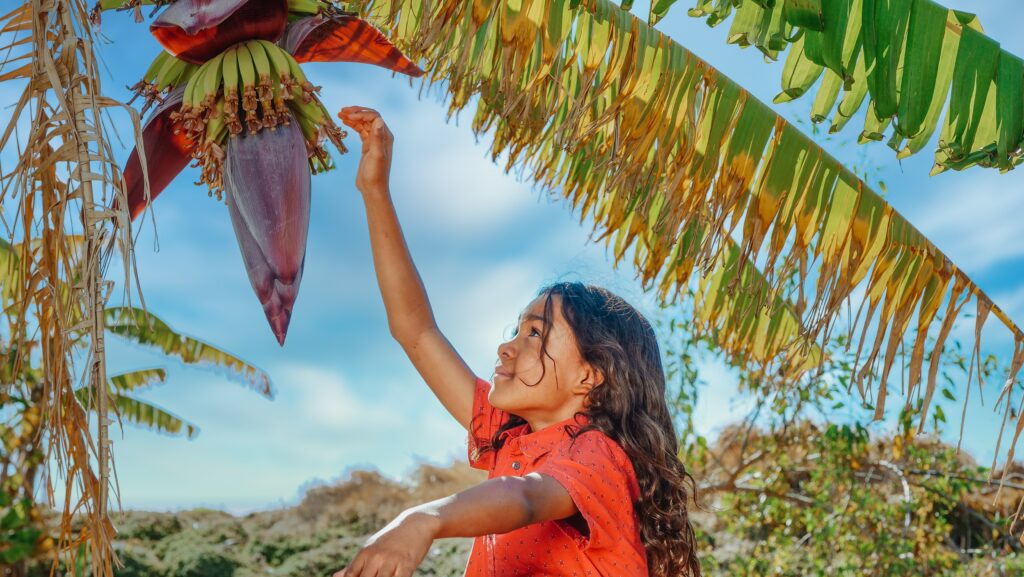
Instead, humans are biologically adapted to fruit-eating and evolved with tropical fruits as their primary food source!
Conclusion: humans and chimpanzees are highly similar in terms of diet
Humans resemble their closest relatives in many aspects – including in their dietary biology! This is why knowing their diet and their dietary classification matters for the understanding of our own diet! Changing our view from the omnivore chimpanzee to the frugivore chimpanzee has major implications on the view of the human dietary ecology.
Knowing the diet of our closest living relatives helps us understand what foods best suit human biology.
Humans and chimpanzees also share many adaptive features that specialize us as fruit-eaters. But are we still as frugivorous as chimpanzees? More scientists should ask this essential question! And as a follow-up question: “What can we learn from wild primate diets?”. Like this citation from K. Milton‘s research published in the journal Nutrition (1999):
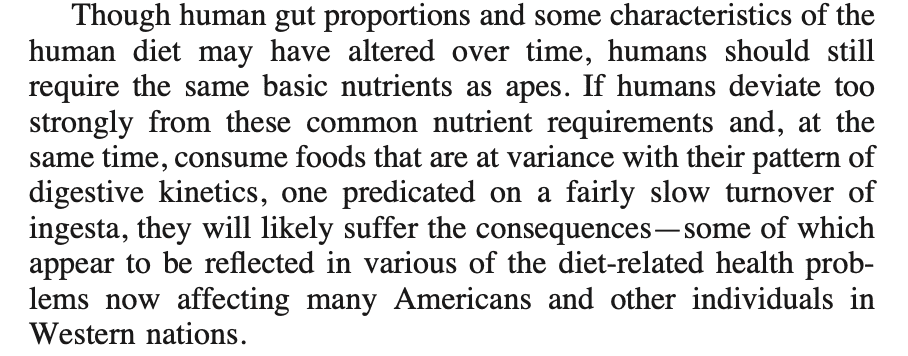
Is a high-fruit tropical diet the most suitable diet for our biology? There are many indications that this might be the case! And in real life, the number of people adopting a high-fruit diet is growing – and reporting tremendous health benefits!
There definitely is something to the chimpanzee diet! For a more in-depth view of the human frugivore diet, visit this article here.
To learn more about the practical part of doing your diet more chimp style, check out our (free and open) Frugivore diet Guide.
References
- Milton, K. (1999) “Nutritional characteristics of wild primate foods: Do the diets of our closest living relatives have lessons for us?,” Nutrition, 15(6), pp. 488–498. Available at: https://doi.org/10.1016/s0899-9007(99)00078-7. (link)
- Foundation, W.C. (no date) What do chimpanzees eat?, WCF | What they eat. Available at: https://www.wildchimps.org/about-chimpanzees/what-they-eat.html (Accessed: April 4, 2023).
- Current trends in consumption of animal products – NCBI bookshelf (1988). Available at: https://www.ncbi.nlm.nih.gov/books/NBK218176/ (Accessed: April 4, 2023). (link)
- Fulk, R., M. Loomis and C. Garland (1992) Nutrition of captive chimpanzees. In: The care and management of chimpanzees in captive environments. Chimpanzee Species Survival Plan – Husbandry Manual. Fulk, R. and C. Garland, Eds. American Association of Zoos and Aquariums
- Lemonick, M.D. (2021) Chimps can’t Cook, but maybe they’d like to, Animals. National Geographic. Available at: https://www.nationalgeographic.com/animals/article/150602-chimp-cooking-evolution-human-brain-science (Accessed: April 4, 2023).
- Chimps use clay to detox and as a mineral supplement, University of Oxford. (2015) Available at: https://www.ox.ac.uk/news/2015-07-29-chimps-use-clay-detox-and-mineral-supplement (Accessed: April 4, 2023). (link)
- No author (2020) Buy a chimp a meal, Chimfunshi Wildlife Orphanage. Available at: https://chimfunshiwildlife.org/appeal/buy-a-chimp-a-meal/ (Accessed: April 26, 2023).
- J. Shurkin, Animals that self-medicate, PNAS (2014). Available at: https://www.pnas.org/doi/10.1073/pnas.1419966111 (Accessed: April 4, 2023). (link)


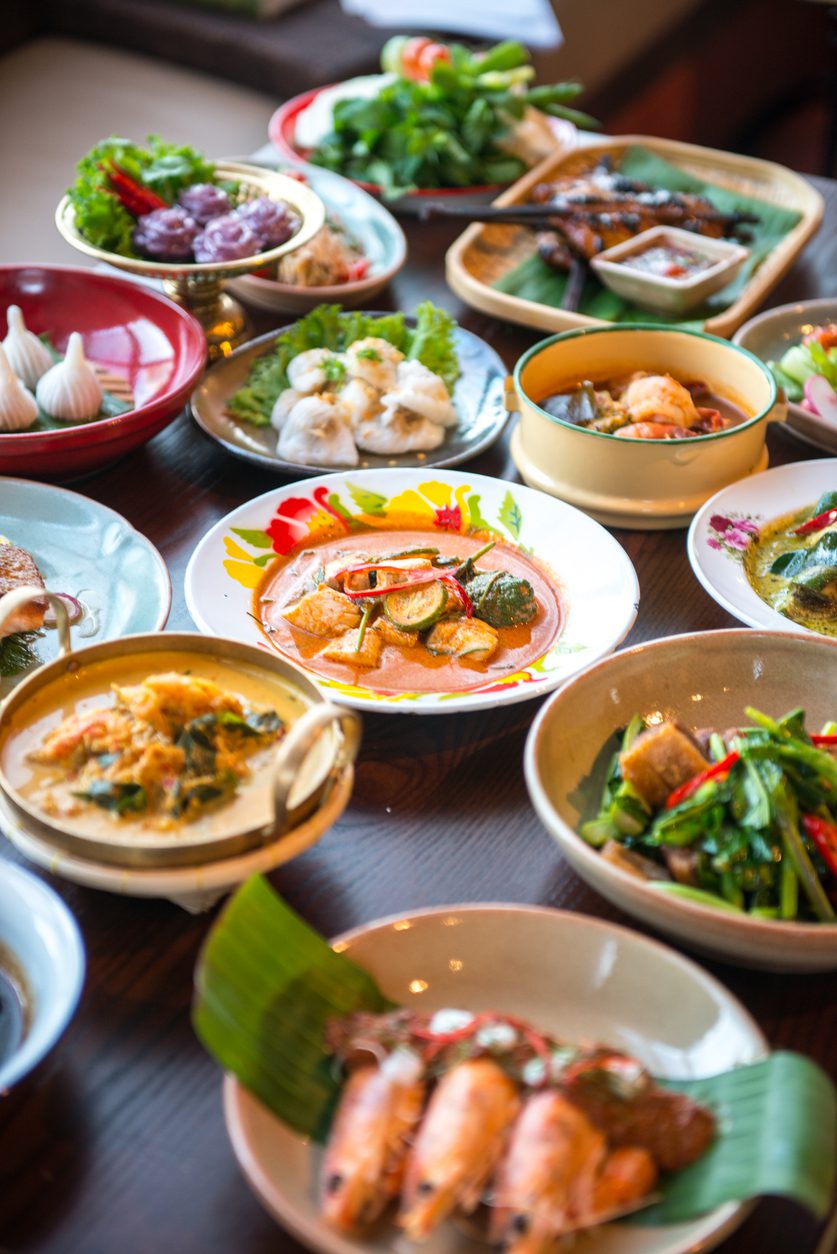
Add Comment